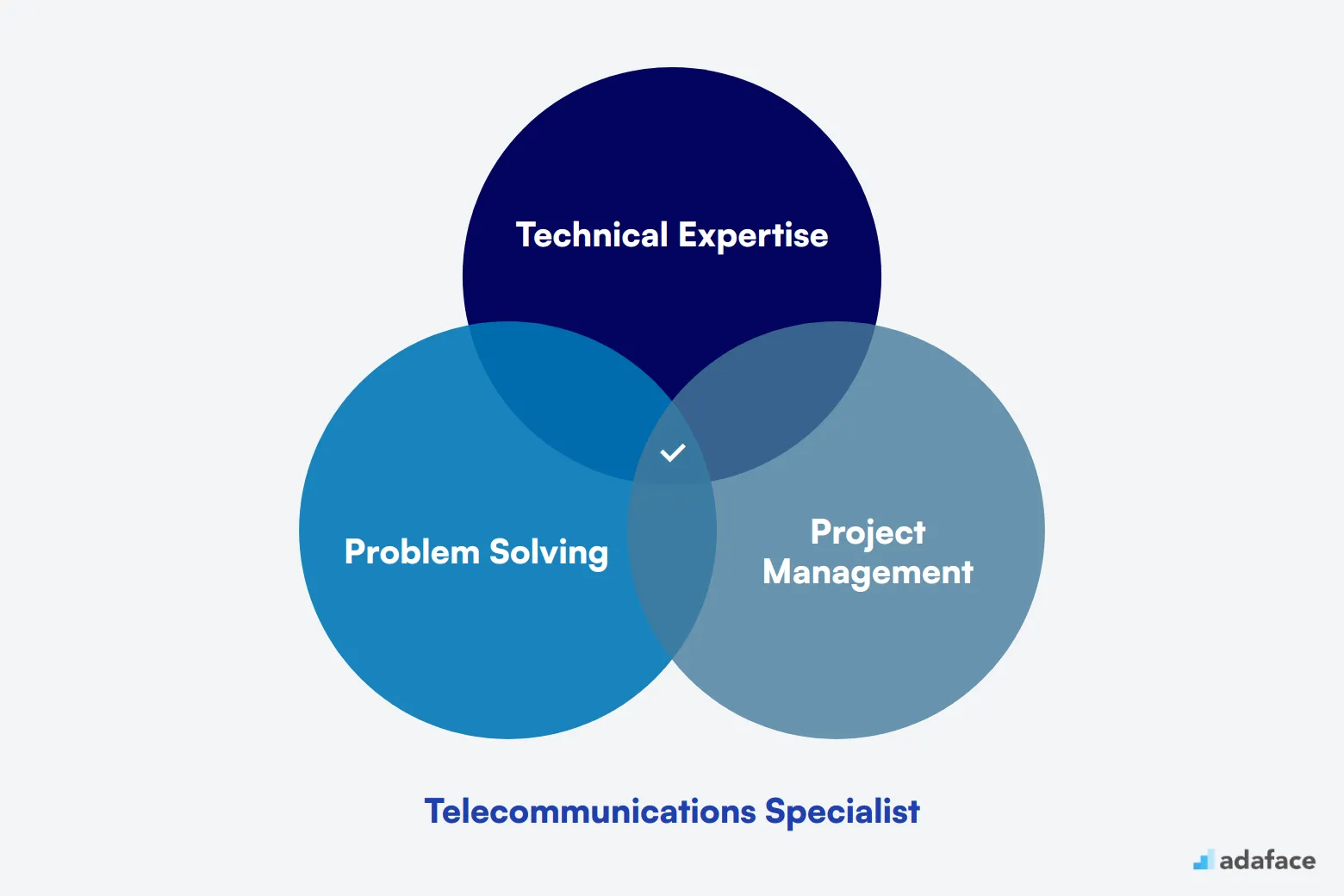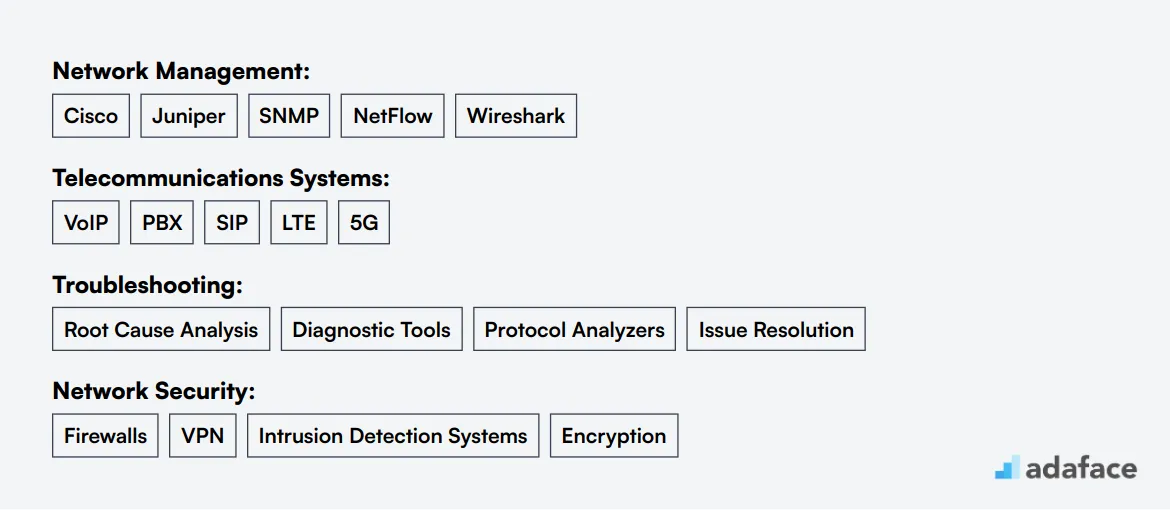Hiring a top-notch Telecommunications Specialist can be a game-changer for your company's network infrastructure and communication systems. However, many recruiters stumble when it comes to identifying the right blend of technical expertise and soft skills required for this role. The key is to look beyond just the certifications and focus on practical experience and problem-solving abilities.
This guide will walk you through the entire process of hiring a Telecommunications Specialist, from crafting an attractive job description to conducting effective interviews. We'll also explore skills assessment tools that can help you evaluate candidates objectively and make informed hiring decisions.
Table of contents
Why Hire a Telecommunications Specialist?
To determine if you need a telecommunications specialist, start by identifying communication challenges in your organization. For example, you might be experiencing frequent network outages or struggling to integrate new technologies into your existing infrastructure.
Consider the following scenarios where a telecommunications specialist could add value:
- Upgrading your company's phone systems to VoIP
- Implementing secure remote work solutions
- Optimizing network performance for multiple office locations
If these issues are ongoing or you're planning major communications upgrades, it's time to consider a full-time telecommunications specialist. For short-term projects or initial assessments, working with a consultant might be a good starting point. Once you've identified your needs, create a telecommunications specialist job description to attract the right candidates.

What Does a Telecommunications Specialist Do?
A Telecommunications Specialist plays a key role in designing, implementing, and maintaining an organization's communication systems. They work with various technologies including phone systems, computer networks, and internet connections to ensure smooth and reliable communication within the company and with external parties.
The day-to-day responsibilities of a Telecommunications Specialist typically include:
- Installing and configuring telecommunication equipment
- Troubleshooting network issues and performing repairs
- Monitoring system performance and security
- Updating and maintaining communication software
- Providing technical support to users
- Collaborating with vendors and service providers
- Staying updated on the latest telecommunications technologies
- Developing and implementing disaster recovery plans
Telecommunications Specialist Hiring Process
Hiring a Telecommunications Specialist typically takes about 1-2 months. Here's a quick overview of the process:
- Create and post a detailed job description
- Review resumes (expect initial applications within 3-4 days)
- Conduct skill assessments or case studies (about 1 week)
- Interview shortlisted candidates
- Make an offer to the best candidate
The timeline can vary based on your organization's pace and the candidate pool. Let's explore each step in detail, providing you with checklists and resources to streamline your hiring process.
Key Skills and Qualifications for a Telecommunications Specialist
Hiring for a Telecommunications Specialist can be tricky. Many recruiters might prioritize technical skills while overlooking critical soft skills that are just as important for success in this role. Clearly distinguishing between what's required and what's preferred can help refine your search and attract the best candidates.
Here are some required skills and qualifications you should look for:
- Bachelor's degree in Telecommunications, Computer Science, or related field
- Three or more years of experience in telecommunications or related industry
- Strong understanding of telecommunications systems and networks
- Excellent troubleshooting and problem-solving skills
- Proficient in network management and monitoring tools
In addition to the essentials, consider these preferred skills and qualifications:
- Master's degree in Telecommunications or related field
- Experience with VoIP or wireless communication systems
- Certifications such as CCNA, CCNP, or equivalent
- Experience with cloud-based telecommunications solutions
- Proven success in a project management or supervisory role
| Required skills and qualifications | Preferred skills and qualifications |
|---|---|
| Bachelor's degree in Telecommunications, Computer Science, or related field | Master's degree in Telecommunications or related field |
| Three or more years of experience in telecommunications or related industry | Experience with VoIP or wireless communication systems |
| Strong understanding of telecommunications systems and networks | Certifications such as CCNA, CCNP, or equivalent |
| Excellent troubleshooting and problem-solving skills | Experience with cloud-based telecommunications solutions |
| Proficient in network management and monitoring tools | Proven success in a project management or supervisory role |
How to write a Telecommunications Specialist job description?
Once you have a candidate profile ready, the next step is to capture that information in the job description to attract the right candidates. An effective job description will clarify the role's expectations and appeal to the most qualified professionals.
- Highlight key responsibilities and impact: Clearly outline the core duties of the Telecommunications Specialist, such as designing and implementing telecommunication systems. Explain how their contributions will enhance communication efficiency within the organisation.
- Balance technical skills with soft skills: While it's important to list required technical abilities, such as familiarity with VoIP systems and network protocols, don't underestimate the need for soft skills like teamwork and problem-solving. This balance ensures you attract candidates who can effectively collaborate and innovate.
- Showcase company and role's unique selling points: Briefly mention what makes your company stand out, whether it's advanced technology, a strong team culture, or opportunities for career advancement. Highlighting these aspects can set you apart from other employers and attract top-tier talent.
For more details, you can refer to the Telecommunications Specialist job description.
Top 10 Platforms to Hire Telecommunications Specialists
With a well-crafted job description in hand, the next step is to list your Telecommunications Specialist position on various job platforms to attract qualified candidates. By using different job sites, you can broaden your reach and tap into diverse talent pools tailored to your hiring needs.
Use LinkedIn to find and connect with Telecommunications Specialists for full-time roles. The platform's professional networking features can help you source candidates with verified work experiences.

Indeed
Indeed is a versatile job board suitable for listing full-time Telecommunications Specialist positions due to its extensive reach and popularity among job seekers.

Glassdoor
Glassdoor allows you to post jobs while providing company reviews. Use it when you want to attract candidates interested in company culture and employee feedback.

For remote, freelance, and specialized roles, platforms like FlexJobs and Upwork offer flexible options to find the right candidate. Freelancer and Toptal are excellent for short-term and high-skilled freelance projects, respectively. Dice is perfect for tech industry roles, while AngelList focuses on startup environments. SimplyHired provides a general approach to hiring across various employment types. To streamline your recruitment process further, consider using an online assessment platform to evaluate candidates effectively.
How to Screen Telecommunications Specialist Resumes
Resume screening is a necessary step when hiring a Telecommunications Specialist, given the number of applicants in this field. It's important to filter through candidates to find those with the right skills and qualifications, allowing you to focus on interviewing only the most promising individuals.

The first approach to resume screening involves identifying key skills and qualifications. Manually review resumes for terms such as 'telecommunications systems', 'network management', or 'troubleshooting'. Look for experience with specific tools like Cisco, Juniper, or VoIP and certifications like CCNA. This will help you shortlist the ones aligned with your needs.
For a more streamlined process, consider leveraging AI-based tools for resume screening. These tools can quickly identify resumes that match the job description by comparing keywords and experience. AI platforms like ChatGPT can assist in sorting through large volumes of resumes while ensuring no good candidate is missed.
Here’s a sample prompt you can use to guide your AI tool:
TASK: Screen resumes to match job description for telecommunications specialist role
INPUT: Resumes
OUTPUT: For each resume, provide following information:
- Email id
- Name
- Matching keywords
- Score (out of 10 based on keywords matched)
- Recommendation (detailed recommendation of whether to shortlist this candidate or not)
- Shortlist (Yes, No or Maybe)
RULES:
- If unsure about a candidate's fit, mark them as Maybe
- Keep recommendation concise
KEYWORDS DATA:
- Telecommunications Systems (VoIP, PBX, SIP)
- Network Management (Cisco, Juniper)
- Network Security (Firewalls, VPN)
For more on identifying the right skills, check out Adaface's skills assessment tools and explore the telecommunications specialist job description.
Recommended Skills Tests for Telecommunications Specialists
Skills tests are a great way to evaluate Telecommunications Specialists objectively. They help you assess technical knowledge and practical abilities beyond what's on a resume. Let's look at some key tests for this role.
Network Engineer Test: This test evaluates knowledge of network protocols, topologies, and troubleshooting. It's important for Telecommunications Specialists who need to understand and manage complex network infrastructures.
Cisco Routing and Switching Test: Use this assessment to check candidates' proficiency with Cisco technologies. It covers routing protocols, switching concepts, and network security - all key for many telecom roles.
Linux Test: Many telecom systems run on Linux, making this skills test valuable. It assesses command-line skills, system administration, and troubleshooting abilities in Linux environments.
Cloud Computing Test: As telecom moves to the cloud, this evaluation becomes more relevant. It checks understanding of cloud concepts, services, and deployment models across major platforms.
Cyber Security Test: Telecom specialists often deal with sensitive data and networks. This test assesses knowledge of security protocols, threat detection, and risk management - all critical for protecting telecom infrastructure.
Case Study Assignments for Hiring Telecommunications Specialists
Case study assignments offer a practical method to evaluate the skills of potential Telecommunications Specialists. They provide insights into a candidate's problem-solving abilities and domain knowledge. However, these assignments can be lengthy, leading to low participation rates, and risking the loss of strong candidates. To strike the balance, here are some recommended case study scenarios tailored for this role.
Optimizing Network Performance: This case study involves analyzing a company's network setup and identifying bottlenecks affecting performance. Candidates must suggest improvements and justify their recommendations. It tests a candidate's understanding of network protocols and their ability to optimize systems, as detailed in our network performance analysis guidelines.
Implementing Security Protocols: In this scenario, candidates are tasked with proposing security measures to protect against cyber threats. They must assess current vulnerabilities and implement solutions. This assignment evaluates a candidate's knowledge in cybersecurity, aligning with concepts covered in our cyber security interview questions.
Designing a Communication System Upgrade: Here, candidates are asked to plan an upgrade of a telecommunications system to meet future demands. This involves assessing current infrastructure, forecasting future needs, and proposing a strategic upgrade path. This case study examines strategic planning and forecasting, as found in our telecommunications specialist interview guide.
Structuring Technical Interviews for Telecommunications Specialists
After candidates pass the initial skills tests, it's time for technical interviews to assess their hard skills in depth. While skills tests are great for initial screening, technical interviews help identify the best-fit candidates for the role. Let's look at some sample interview questions to gauge a Telecommunications Specialist's expertise.
Here are 5-6 example interview questions for Telecommunications Specialists:
- Can you explain the difference between circuit-switched and packet-switched networks?
- How would you troubleshoot a VoIP call quality issue?
- What's your experience with network protocols like TCP/IP, UDP, and OSPF?
- Describe a complex telecommunications project you've worked on and your role in it.
- How do you stay updated with the latest telecommunications technologies and trends?
- Can you explain the concept of Quality of Service (QoS) in networking?
Cost of Hiring a Telecommunications Specialist
The cost of hiring a Telecommunications Specialist varies widely based on experience, location, and industry demand. According to salary data, the average annual salary for these professionals in the United States ranges from $34,958 to $107,666, with a median of $61,350. Keep in mind that total compensation may include benefits, bonuses, and other perks beyond the base salary.
Telecommunications Specialist Salary in the United States
The average salary for Telecommunications Specialists in the United States ranges from $34,958 to $107,666, with a median of $61,350. Salaries can vary significantly based on location, with Washington, DC offering some of the highest pay scales, ranging from $49,583 to $148,415 annually. In contrast, cities like Fort Smith, AR tend to offer lower salaries, typically between $30,832 and $43,750 per year.

What's the difference between a Telecommunications Engineer and a Telecommunications Analyst?
Telecommunications Engineers and Analysts often work side by side, but their roles and responsibilities are quite distinct. While both contribute to the smooth operation of telecom systems, they approach this goal from different angles.
Telecommunications Engineers focus on the physical aspects of network infrastructure. They design, install, and maintain communication systems using tools like CAD software and network simulators. Their expertise lies in circuit design, RF engineering, and solving technical network issues.
In contrast, Telecommunications Analysts concentrate on the data side of operations. They monitor network performance, analyze data trends, and optimize systems for efficiency. Their toolkit includes database management and business intelligence software, and they're often versed in SQL and data analysis techniques.
The educational backgrounds and certifications for these roles also differ. Engineers typically have degrees in Electrical or Telecommunications Engineering and pursue certifications like Cisco CCNA/CCNP. Analysts often come from Computer Science or Information Systems backgrounds and may hold ITIL or CompTIA A+ certifications.
In essence, while Engineers build and maintain the network, Analysts ensure it's running at peak performance through data-driven insights and optimization.
| Telecommunications Engineer | Telecommunications Analyst | |
|---|---|---|
| Primary Focus | Network Design and Maintenance | Data Analysis and Reporting |
| Educational Background | Electrical/Telecommunications Engineering | Computer Science/Information Systems |
| Technical Skills | Circuit Design, RF Engineering | Data Analysis, SQL |
| Tools Used | CAD Software, Network Simulators | Database Management Tools, BI Tools |
| Problem Solving | Technical Network Issues | Efficiency and Performance Issues |
| Certifications | Cisco CCNA/CCNP | ITIL, CompTIA A+ |
| Key Responsibilities | Design, Install, Maintain | Monitor, Analyze, Optimize |
| Industry Keywords | Bandwidth, Frequency, RF | KPIs, Metrics, Data Trends |
Streamline Your Telecommunications Specialist Hiring
Throughout this guide, we've covered the key aspects of hiring a Telecommunications Specialist. From understanding their role and responsibilities to crafting effective job descriptions and conducting thorough interviews, each step plays a critical part in finding the right candidate for your team.
If there's one takeaway from this process, it's the importance of using well-defined job descriptions and targeted skills assessments. These tools help ensure accuracy in your hiring decisions. Consider using a Network Engineer Test to evaluate candidates' technical proficiency and make data-driven hiring choices.
CISCO Routing Switching Test
FAQs
Look for candidates with a bachelor's degree in telecommunications, computer science, or a related field. Certifications like CCNA, CompTIA Network+, or BICSI are valuable. Prioritize practical experience in network design, implementation, and troubleshooting.
Use technical assessment tests to evaluate candidates' knowledge of networking protocols, telecommunications systems, and problem-solving abilities. Consider giving practical case studies or simulations to assess their hands-on skills.
Key soft skills include excellent communication, teamwork, adaptability, and project management. Look for candidates who can explain complex technical concepts to non-technical stakeholders and work well under pressure.
Look on specialized job boards for tech and telecommunications professionals, attend industry conferences and job fairs, and leverage professional networks like LinkedIn. Consider partnering with technical schools or universities that offer telecommunications programs.
Start with a phone screening to assess basic qualifications and communication skills. Follow up with a technical interview that includes practical problem-solving scenarios. Consider a panel interview with team members to evaluate cultural fit and collaboration skills.
Be cautious of candidates who can't provide specific examples of projects they've worked on, lack knowledge of current industry trends and technologies, or show poor communication skills. Also, watch for inconsistencies in their work history or inability to explain technical concepts clearly.
Look for candidates who demonstrate a commitment to continuous learning. Ask about their recent certifications, attendance at industry conferences, or participation in professional development activities. Consider offering ongoing training and certification opportunities as part of the job package.

40 min skill tests.
No trick questions.
Accurate shortlisting.
We make it easy for you to find the best candidates in your pipeline with a 40 min skills test.
Try for freeRelated posts
Free resources



